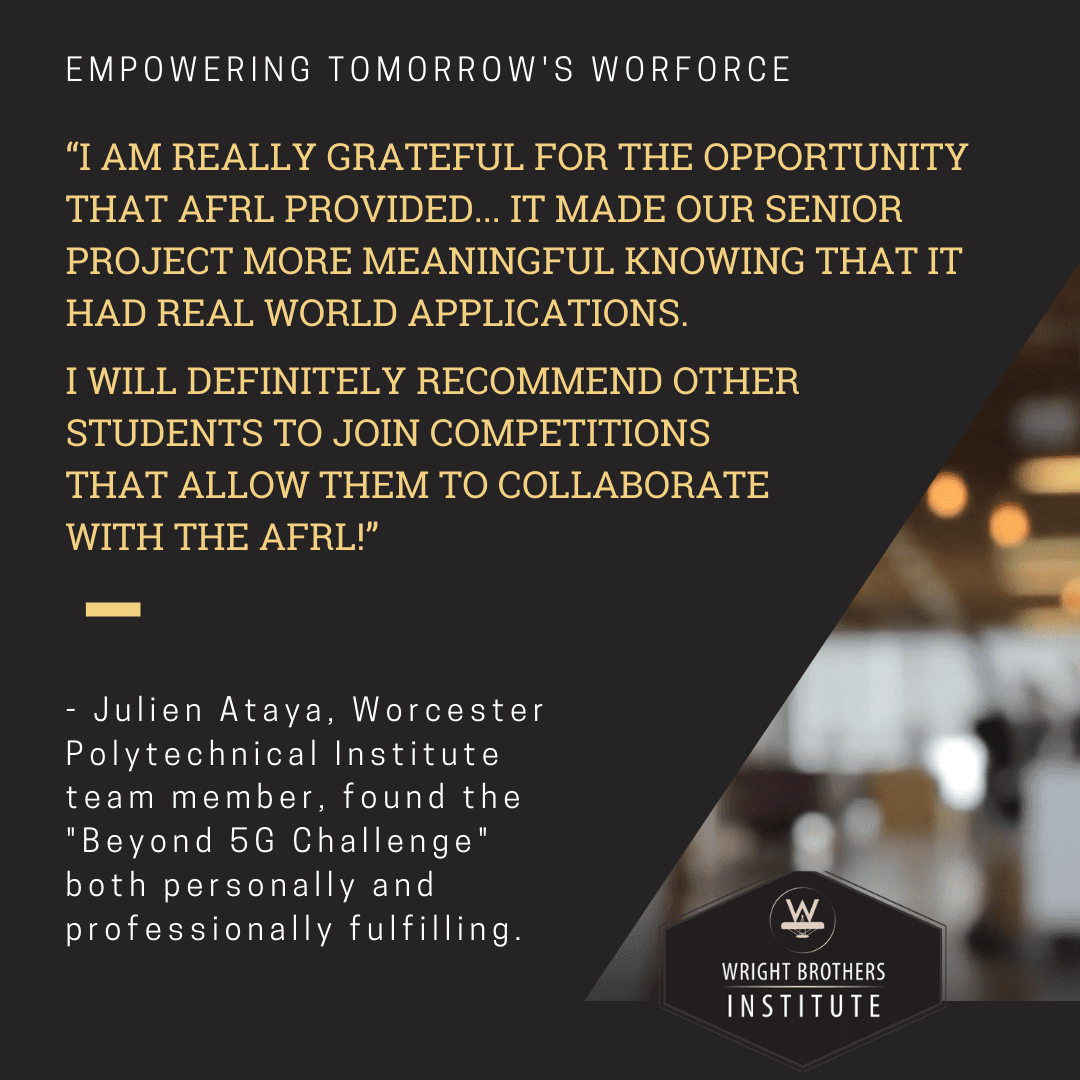The future is 5G, and Wright Brothers Institute is helping pave the way for the current and future Air Force Research Laboratory (AFRL) workforce to make the most of it.
5G – fifth generation – is the next generation of wireless networks and is in many ways a vast improvement over 4G. According to c|net.com, the biggest pros are its huge bandwidth, its low latency (ability to respond quickly when transferring data back and forth), and high density, or the ability to “connect everything.” This has big implications for the military. A Congressional Research Service report stated that “5G technologies are expected to support interconnected or autonomous devices, such as smart homes, self-driving vehicles, precision agriculture systems, industrial machinery, and advanced robotics. 5G for the military could additionally improve intelligence, surveillance, and reconnaissance (ISR) systems and processing; enable new methods of command and control (C2); and streamline logistics systems for increased efficiency, among other uses. As 5G technologies are developed and deployed, Congress may consider policies for spectrum management and national security, as well as implications for U.S. military operations.”

WBI and AFRL worked with National Instruments to give the selected universities kits based on NI USRP-2901 SDRs, which allow the students to explore a wide variety of SDR applications. The goal was twofold: first, to build SDR skills by encouraging universities to incorporate SDR/SDN technology in their undergraduate and graduate curriculum, allowing students to develop hands-on skills by turning them loose to explore SDR technology; and second, to challenge students to develop novel solutions to sensing and networking problems using SDRs.
System architects, programmers and application engineers with SDR programming and application skills will be in high demand. The students participating in this challenge gained insight to a possible government career path.
Julien Ataya, a Worcester Polytechnical Institute team member, found working with AFRL both personally and professionally fulfilling. “I am really grateful for the opportunity that AFRL provided my team members and I to showcase our project and represent our school. It made our senior project more meaningful knowing that it had real world applications,” he observed. “I will definitely recommend other students to join competitions that allow them to collaborate with the AFRL!”
Challenges such as this are a non-traditional method of spurring innovation, used to tease out new ideas and novel capabilities. Government, from the federal level on down, use challenges to field new ideas, as does industry.
The success of the 2019 AFRL challenge led to Dr. Hary greenlighting the second of what he hopes will be an annual event, which runs through the academic year. In 2019, the challenge culminated with an in-person showcase at WBI facilities in downtown Dayton, Ohio. That was also the plan going into the 2020 challenge, but the coronavirus pandemic and ensuing shutdown of universities and workplaces necessitated an adjustment.
WBI, known for innovative thinking and quick responses, transformed the challenge into a virtual effort for which the university teams were required to submit short videos of their work, judged by the panel of WBI and AFRL experts. The winning teams were from the University of Cincinnati and Worcester Polytechnic Institute, with each team winning a $5,000 prize.
Dr. Alexander Wyglinski, advisor for the Worcester team, heartily endorses the challenge and the organization behind it. “AFRL is a great organization,” he said. “This student competition is just one more positive interaction between myself and my students with AFRL; I’ve collaborated with AFRL on several projects over the past 15 years, and all of these experiences were very rewarding.”
AFRL gains access, training to 5G
To prepare the current AFRL workforce, WBI secured G Suite licenses in Google’s cloud computing environment for a core team from AFRL’s Materials and Manufacturing Directorate, providing unheard-of ease of access and collaboration for its users. While the Beyond 5G SDR challenge focused on the future, WBI was busy arming a hand-selected team of researchers with G Suite, a cloud computing tool that has won the blessing of AFRL leadership and become a sought-after capability by others in AFRL.
To date, WBI has secured 850 licenses for AFRL use. G Suite has the potential to change the way AFRL works, as it allows immediate access to secure sites, makes collaboration easy, and removes much work required to track and maintain IT assets. One cheap laptop, and an AFRL engineer is good to go.
In early June 2020, it was announced that seven installations would be added to the five existing installations currently experimenting with how 5G will best serve the warfighter. "DoD recognizes that industry is driving 5G technology with massive investments in the many hundreds of billions of dollars," DoD Technical Director Joseph Evans said at a press conference announcing the expansion. "Because of that, DoD is working closely with industry partners to leverage those investments for military applications. In the coming weeks, the department will issue requests for proposals from industry from those industry partners to prototype and experiment at these Tranche II bases."
AFRL’s G Suite “gatekeeper” Dan Berrigan has fulfilled requests from the Materials and Manufacturing, Aerospace Systems, Sensors, and Space Vehicles directorates; ACT 3; the Transformational Capabilities Office and ManTech. This pilot program, launched in March 2019, has been approved by Mr. Michael Hanke, director of Research Collaboration and Computing, giving AFRL personnel legal permission to use the airforceresearchlabcom site.
With AFRL’s workforce adopting and adapting to cloud computing through WBI’s program - which secured training from Google experts in addition to the licenses- AFRL is ahead of the 5G curve and will almost certainly weather the coming transition with ease.
RESOURCES:
What 5G Is and Why You’ll Want It This Year
https://www.cnet.com/how-to/what-is-5g-you-want-it-this-year/
After Breaking Through 5 Million Users, How Will Google G Suite Capture the Hearts of Big Companies in the Next Step?
Challenge.gov:Using Competitions and Awards to Spur Innovation
http://www.businessofgovernment.org/sites/default/files/Challenge.gov_.pdf
Prize Competitions: Effective Strategy to Spur Innovation?
https://ssti.org/blog/prize-competitions-effective-strategy-spur-innovation
DoD Announces New Locations for Additional 5G Testing, Experimentation
5G to Aid Warfighters, Thwart Adversaries
